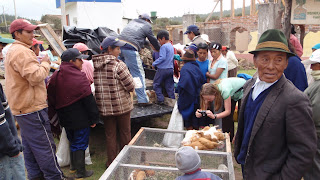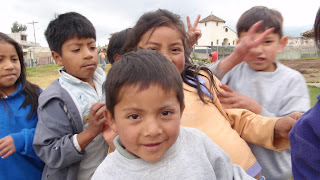
It´s 4:00 AM, the sun hasn´t yet risen, stars from both hemispheres fill the sky, and Carmen and Miguel, my host mother and father, are awake and readying themselves for the long day ahead of them. They dress in silence, careful not to wake their youngest daughter, Rubi; who shares the same room. The pigs, sheep, and chickens need to be let out of the shed to root in the grass in front of the small store above the house, and the herd of guinea pigs need to be fed the scraps from yesterday´s meals.
Around 5:00 AM one of my host parents turns on the light in the room shared by my two host sisters, Flor and Marta, and their brother, Angel, beginning the day for the three of them (not without grumblings). Carmen and Miguel then begin the walk to their cows for the daily milking. Marta, the oldest, begins breakfast. The locro con papas (a soup with potatoes, milk, carrots, onion, fresh cheese, and avocado) from last night´s dinner needs to be heated up, the green bananas need to be sliced and fried into a dish called platacones, and the tomates de arbol (from the family garden) need to be ground into juice.

The in-house PC volunteer-in-training, Lauren, rolls out of bed with the sun around 5:45 or 6:00, depending on if she´s taking a shower that morning or not. She eats breakfast at 6:30 with Angel, Flor, and Marta, who leave at 7:00 with a ´chao, Lauren´ to take the bus to school in Cayambe, 30 minutes away. Lauren has just enough time to scrape the leftovers into the bucket for the chonchos (pigs), wash the dishes, and brush her teeth before she too has to leave for classes at 8:00, which are only a five minute walk away in another volunteer´s house. On her way she passes Miguel and Carmen, both loaded down with the morning´s milk: Carmen carries her milk wrapped in a shawl on her back, while Miguel carries his by hand. Rufu and Gusu, the family dogs, follow, though at a distance since both are involved in disputes with the other village dogs.

Once home Miguel quickly eats and changes into clothes for his construction job in Cayambe. Carmen finishes off the platacones, and a bowl of soup, then pours the rest of the soup into the communal bowl for the dogs and cats. The rest of the morning is spent in the garden (smaller this year because of the drought) harvesting pepinos, tomates de arbol, quinoa, maiz, papas, zuccini, tomates, and calabezas (gourds). At about 11 she puts the large soup pot on to boil, adds choclo (corn cobs), onion, chunks of chicken, green bananas, milk, potatoes, carrots, and barley. A large pot of white rice joins the bubbling soup on the stove.

12:30 heralds five hungry gringos, one teacher, and Rubi (done with school at 12:00) who devour the soup but have a harder time with the mountain of rice and fresh cucumbers. Conversation at the table is mainly between the teacher (a native Ecuadorian), and Carmen, since the students still have a long way to go to master the Spanish language. Before leaving for another three hours of class they help clean up the small kitchen.

Afternoons for Carmen are spent repairing water or fences in the cow pasture, cleaning house, washing clothes (a never ending cycle, and helping customers in her store. Once Marta, Flor, and Angel return from school they feed the pigs the leftovers from the pig bucket, return the sheep and chickens to their respective pen and roosts, continue with the washing, then start their homework. Around 4:00 two kids head out to the cow pasture for the second milking of the day. At 5 or 6 Lauren returns to an already bubbling soup pot and joins a table of studious kids to go over her vocab words or help out with English homework. By 8:00 the whole family is gathered around the table ready for the quinoa soup and maybe candied babaco that Carmen sometimes fixes as a treat. After eating Carmen and Miguel are having a hard time keeping their eyes open, and soon after take themselves to bed. The kids, however, have a couple of hours of studying left.
Though she works half as hard and gets more sleep than the rest of the family, Lauren is ready for bed soon after Carmen and Miguel, probably due to her strained and overused brain muscles from trying to speak and understand a foreign toungue all day. Once in bed she treats herself to a few minutes of a favorite book (in english!), then turns off the lights and prepares for another day in Ecuador.























 >
>
























